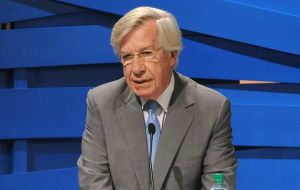MercoPress. South Atlantic News Agency
Astori forecasts Uruguay's inflation in the range of 3 to 7% in the next two years
 Uruguay's Vice-president argues that the current foreign exchange policy has helped contain the impact of volatility
Uruguay's Vice-president argues that the current foreign exchange policy has helped contain the impact of volatility Vice-president Danilo Astori confirmed that Uruguay will continue with its current flexible foreign exchange policy, because “this has helped us reduce volatilities”, but also admitted concern about inflation, the third highest in South America and fourth in Latin-American and the Caribbean.
“We must be very active about keeping track of inflation and we have to be very cautious with the overall budget expenditure”, said Astori during a political rally. We could bring the deficit down to 2% of GDP, but we shouldn't over do that“, said Astori in reference to the budget red which ranges from 1.8% to 2.8% of GDP depending on the methodology.
Astori admitted that inflation was currently running above 9% and it is needed to lower the index to 3 to 7%, which ”I'm convinced we are going to achieve it in two years time”.
Uruguay's economic policy has been criticized for its excessive deficit in times of strong solid growth. The economy has been expanding for the last decade but the government has been unable to save for possible harder times further ahead and a policy of high interest rates has attracted a massive inflow of capital strongly appreciating the Uruguayan Peso. This had led to higher costs (in dollars) for exporters and made it difficult for local industry to compete with 'cheap' imports.
Besides the fact that the Central bank to keep an exchange rate reasonably attractive for commodity exporters, has continued to absorb dollars at rates far above the international level. These additional funds are then reinvested in US Treasury bonds at a lower rate. But in this vicious circle the Uruguayan Peso without the central bank intervention would continue to appreciate further dentin competitiveness. According to local economists, this policy is costing the Uruguayan central bank anywhere between one billion and 1.1 billion dollars annually.
Meanwhile the latest IMF annual estimates indicate that the Uruguayan economy will expand 3.5% this year, down from 3.8% in its previous six-month report. Likewise in 2014 growth was downgraded from 4% in April to 3.3% in September. Regarding inflation the IMF anticipates Uruguay will have the fourth highest rate in Latam and the Caribbean both this year and in 2014.




Top Comments
Disclaimer & comment rules-

-

-

Read all commentsAt least they are trying.
Nov 18th, 2013 - 07:25 pm 0I wonder if some of the inflation is not transfered by the imports of Argentine goods that are under inflation already here and suffer from increasing production and transport costs...
Nov 18th, 2013 - 10:22 pm 0With their economies so integrated and their distance from each other; then price distortions and inflation-bleeding is possible.
Nov 18th, 2013 - 11:08 pm 0However running a continual deficit even in the good times is not helping. Uruguay needs to cut back on its growth in government expenditure.
Commenting for this story is now closed.
If you have a Facebook account, become a fan and comment on our Facebook Page!